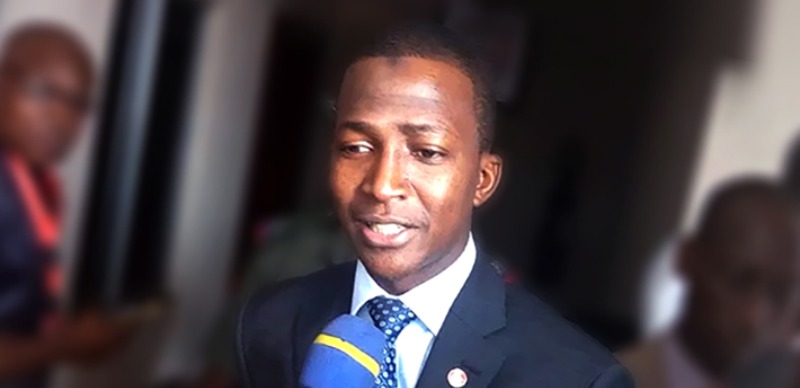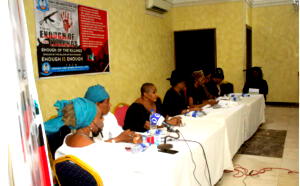Abdulrasheed Bawa By Segun Ige PRESIDENT Muhammadu Buhari could actually be whitewashing the Economic and Financial Crimes Commission th...

By Segun Ige
PRESIDENT Muhammadu Buhari could actually be whitewashing the Economic and Financial Crimes Commission through the approval of Abdulrasheed Bawa. The EFCC is crucially a formative organ in the Nigerian justice system. Buhari could, ideologically speaking, be making the gesture that this ‘born-again’ EFCC would demonstrate unflinching conversion and redemption of lost years.
It would be a sheer ignominy and impunity to overlook how, even at 60, we still can’t manage ‘small matters’. I’m extremely appalled by the fact that the Ibrahim Magu case had to be presided over by the U.K. Business and Property Courts of England and Wales. To be sure, certain constitutional scholars and legal practitioners were glad that Magu eventually won the case – but have indeed forgotten that unless the commercial court intervened, we could still be perennially grappling with one Magu case, or worse still, just wrap it away in a nolle prosequi or dead-end sine die.
Perhaps Bawa is a Chair of ‘circumstances’. not necessarily of ‘necessity’. The circumstances where the circulatory leaders do not know which is which. The circumstances where even the Attorney General of the Federation and Minister of Justice, Abubakar Malami, is not ‘qualified’ to hold corruption-allegation debates on public officials. Bawa’s approval as EFCC chair on Wednesday, February 24, 2021 by Senate President Ahmed Lawan is historic in one way or another. For one, his appointment is a beacon of hope to youth who’ve largely been denied access in a public political participation.
[ALSO READ] Monguno is damned in translation
From time immemorial, of course, Nigeria has been bedeviled with the same set of leaders harum-scarum exchanging pedigrees and portfolios and positions. The same set of minds and mindsets roundly removing, replacing, and recruiting people in their legion, religion, circle and caucus has for long become our political processes. What’s the result? It’s been the same polity awash with recurrent and recursive manifold manifestation of moral decadence, abnormal decency, inordinate affection, and insensitive depiction and demonstration of despicable deploration of power on people. This is how slippery slope the system has been for a very, very long time.
For another, and more importantly, Bawa would be the blueprint for building inclusive politics. At 40, Bawa would be the first youngest chair of the EFCC. The fact that he’s from the North shouldn’t presume, disinterestedly, that “he’s one of them”. The counter-intuition of “god-fatherism” notwithstanding, I think we should give him a benefit of doubt by watching him discharge his course of duty; that shouldn’t be the reason for allegations of money-laundering, or sound-bite sumpsimus, of some begrudging apparatchiks, who rarely do not see the need for fresh blood to mingle and dine in the paradise and paradigm of political deliberation; and that shouldn’t be why the juvenile’s raison d’être would be so thwarted and truncated amid old-rugged crews.
The lesson to be learnt behoves youth who’re aspiring to be politically recognised public figures without some form of preparation or perspiration. It’s a good thing wanting to hold some political office. But then, the question comes whether one is competent or fit to hold such position. Leadership is not about “who you know”, by the way. You’ve got to show the infallible proof and evidence that, indeed, you’ve got what it takes, you’ve mastered the ins and outs, and you’ve demonstrated an irreproachable expertise and experience in the position you’re coming to hold. That’s what Bawa has indisputably and indispensably portrayed during the plenary question-and-answer session. Surely, the youth could take a cue from this.
What is even more considerable, our leaders need to effect certain changes in the architecture of the leadership system, such that the youth are fully integrated into democratic processes of decision-making and leadership building. It’s a shame that the testimony we hear is how the youth fundamentally become electioneering machinery in securing and procuring votes and supports for power moguls and mongrels; it’s how they risk their lives becoming miscreants and mayhem perpetrators for political ends to meet; and it’s how they’ve sadly given up on their dreams and brain-building power because of a group of megalomaniacs who’ve suddenly made the world theirs, their children and children’s children.
Some of them have, in short, regretted ever being a citizen of the country. That’s such a repeatedly bitter narratology we grapple with in Nigeria, which is not supposed to be at all. In an increasingly technological modern way of doing things, I think the youth would be in a better position to build the foundation of our leadership structures. That’s a way we could move forward, namely by encouraging and supporting youth participation in every sphere of governance and leadership. After all, we say, they are the leaders of tomorrow – but, I say, they are the leaders of today!
To that end, we should not be prejudiced or preconditioned by youths who’re not willing to pay the price, work out their ass, and be committed to consistent practice and continuous learning. That would have been a perverse way of generalising the creative prowess and potential of well-meaning youths. Aside paper presentation, we need to start valuing the importance of productivity and creativity.
[ALSO READ] CBN to sell N570bn Treasury Bills by Q2’21
What we can genuinely produce is what could add to the progress, profit and gross domestic product of our country, instead of depending and absolutely relying on import substitution and subscription. Really, some youths are just wonderful wunderkinds born with certain gifts meant to be discovered, developed and distributed. And, again, we do need to give them the space and chances to showcase their skills, competence and ingenuity. We really have crucial roles to play in the discovery, developing and distributing processes.
Speculation of course – but that’s what’s trending globally, and Bawa has made us realise that, to an extent. It should not be so surprising that at early ages champions are usually celebrated and produced from the other parts of the world. This is so because the adult barely recognises age-limit as barrier to inclusive politics. Politics doesn’t expel and expunge youths who’re born to be change-makers.
This reminds me of what Barack Obama beams as “bending history” in his book A Promised Land. That’s extremely true. It could be dire if history should be a documentary dictator of the decision and destiny of our country; and, by the same token, it could be detrimental if history is relegated to the background. It then means our action and reaction ought to be informed by a “balanced perspective”, which is one of the qualities of values-based leadership, according to Harry Kraemer. And without bending the American history of institutional racism and systemic discrimination, Obama obviously wouldn’t have been the first U.S. African- American president.
So, to progress and advance, history has to be “bent” in such a way that it would accommodate and assimilate the “white,” the “black,” and indeed the “black-white” – that is, those from either mixed backgrounds, origins, or upbringings. It’s in our power to “bend history” so that it would suit our purpose and demands of present existence. And Bawa’s breakthrough is just the dawn of a new beginning as he’s iceberged the official landmark for Bawa wannabes.
The post Could FG be whitewashing EFCC through Bawa? appeared first on Vanguard News.

No comments